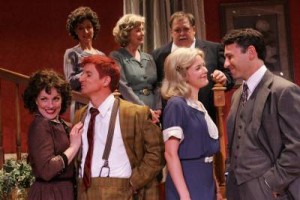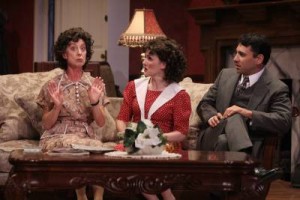
It’s mid-December 1939 and all Atlanta is atwitter with excitement over the tonight’s gala premiere of Gone With The Wind. Christmas trees are being decorated all across the city including at the home of Adolph Freitag. What, you ask? Freitag doesn’t sound like a Christian name. You’re absolutely right. “Take down that star!” Beulah “Boo” Levy orders her daughter Lala. “Jewish Christmas trees don’t have stars!”
If it sounds as if we’re back in Driving Miss Daisy land, that’s no coincidence. The Last Night Of Ballyhoo was written by Miss Daisy’s Alfred Uhry, and like Uhry’s earlier play, takes an affectionate look (and at times pokes gentle fun) at Jews down South in an earlier age.
In fact, Boo and Lala have more important things on their minds than decorating a Jewish Christmas tree or watching Hollywood’s biggest stars arrive for the GWTW premiere (though Lala most definitely intends to be there to catch a glimpse of Clark Gable). “Ballyhoo” is less than two weeks away, Boo tells Lala, and no one has asked Lala yet! It’s time for Lala to take matters into her own hands and invite Sylvan aka Peachie Weil to the biggest party of the year.
“Girls don’t ask boys to Ballyhoo,” Lala informs her mother. Besides, Lala is too busy writing her novel (entitled Though Your Sins Be Scarlet) to have time to think about finding a date. She’s even written the novel’s first sentence: “From where she sat atop the weathered buckboard wagon, Ropa Ragsdale could see the charred and twisted remains of her beloved plantation.” (How’s that for florid writing!)
If Lala Levy seems a bit “off” to you, she’s not alone in the quirky Freitag household, which also includes Boo’s brother Adolph and widowed sister-in-law Reba. In this house of women, Adolph has learned to keep his mouth shut (most of the time at least), and Reba… Well, Reba is the kind of woman who named her daughter Sunny because she was born during a terrible storm. “We couldn’t have called her Cloudy, could we?” asks Reba, as if anyone could possibly doubt her logic.
Like Alice in You Can’t Take It With You, Reba’s daughter, the very normal Sunny Frieitag, sticks out like a sore thumb, though a very pretty, intelligent, blonde thumb. Sunny is blooming like a rose at Wellesley, unlike cousin Lala who dropped out of college early in her freshman year due to homesickness, poor girl.
Enter Joe Farkas, a good-looking New York Jew (and new employee of uncle Adolph) who is instantly taken with Sunny but a bit confused by her family’s lack of Jewishness. Lala may once have been to a Sader (she pronounces it “seder”) at a friend’s house, but that’s about all she knows of Jewish traditions. And, wonders Joe, what’s all this talk about “the other kind?” (It turns out that in Atlanta, “the other kind” i.e. Russian Jews, are looked down upon by German Jews like the Freitag/Levys.)
It is Sunny’s awakening to the fact that being Jewish means more than just having a Jewish last name that elevates The Last Days Of Ballyhoo to something other than just a light comedy about a bunch of wacky Southerners. It is that, indeed, and a very funny comedy at that, but playwright Uhry has important things to say as well.
His characters use ugly words like “kike” and “yid” to refer to “the other kind.” About Sunny’s ignorance of things Jewish, Joe tells her, “It doesn’t mean you’re not Jewish. It just means you don’t want to be.” And then there’s the matter of what’s happening in Europe. “This Hitler business in Poland,” declares Adolph. “It’s not good.”
Fortunately, for those who prefer their social/religious consciousness-raising in easy doses, Ballyhoo is for the most part a light and very funny comedy, as when a fuming Lala throws huge clumps of tinsel on the tree and Boo informs her that “it’s supposed to go on strand by strand,” or when Reba opines that “higher education can lead to insanity.” Comical indeed is Lala’s Ballyhoo gown, straight out of Gone With The Wind, which causes uncle Adolph to dub her Scarlett O’Goldberg. (He refers to his sister Boo as “the Jewish Tallulah Bankhead.”)
Jules Aaron once again proves his directorial mettle here, guiding his cast to performances that never enter the realm of caricature. Stacy Barnhisel captures all of Lala’s awkwardness and lack of social graces, yet makes her loveable, even though we cringe when she declares Jewish holiday traditions “a lot of ish-kabibble.” In the role of Boo, the excellent Ellen Crawford is scarcely recognizable as the same actress who recently played the aged Miss Havisham in Great Expectations. Here, she’s a Southern flower made of steel. Michèle Marsh makes Reba more real and less of an airhead than she is usually played, Michael Rothhaar’s Adolph is a master of the slow burn, and Kate Steele is lovely indeed as Sunny. (Rothhaar and Steele shine in a very sweet uncle/niece scene, in which Adolph recalls the only time he was in love … with a girl he used to catch glimpse of on the streetcar.) A first-rate Gregory Sims adds a virile Yankee presence to the mix as Joe, and a newly red-headed James Leo Ryan manages to turn prankster Peachy into a likeable chap, albeit severely in need of etiquette lessons.
John Iacovelli’s set design fills the La Mirada stage with an elegant, detailed upper class southern home, and morphs quickly into a train compartment, thanks in large measure to J. Kent Inasy’s fine lighting design. Dwight Richard Odle’s costumes capture the late 30s look to perfection, and Josh Bessom’s sound design incorporates Max Kinberg’s lovely original incidental music.
This is the fourth production I’ve seen of Ballyhoo, which has become a regional and community theater standard, but the first time I’ve seen it performed with an all Equity cast on a Broadway scale stage. As always, McCoy Rigby entertainment has assembled a superlative cast, director, and design team, and in such capable hands, it’s easy to see why Uhry’s play won the Tony. Mixing fun with a message about the importance of honoring traditions, The Last Night Of Ballyhoo makes for a winning evening of theater.
La Mirada Theatre for the Performing Arts, 14900 La Mirada Boulevard, La Mirada.
www.lamiradatheatre.com
–Steven Stanley
June 10, 2008




 Since 2007, Steven Stanley's StageSceneLA.com has spotlighted the best in Southern California theater via reviews, interviews, and its annual StageSceneLA Scenies.
Since 2007, Steven Stanley's StageSceneLA.com has spotlighted the best in Southern California theater via reviews, interviews, and its annual StageSceneLA Scenies.







 COPYRIGHT 2024 STEVEN STANLEY :: DESIGN BY
COPYRIGHT 2024 STEVEN STANLEY :: DESIGN BY